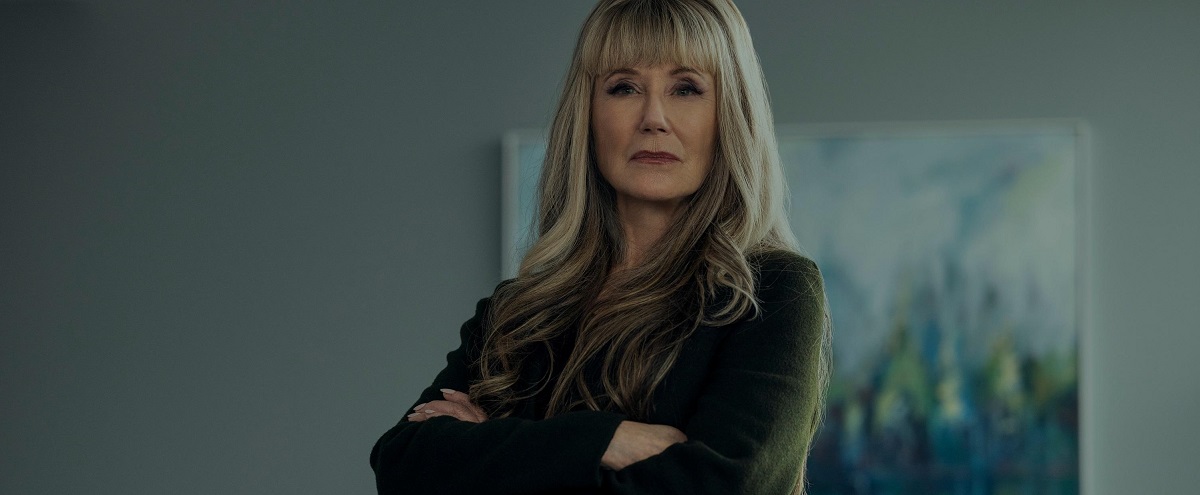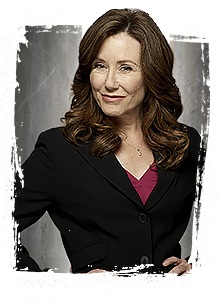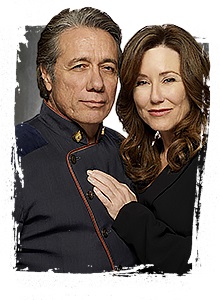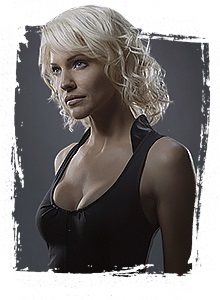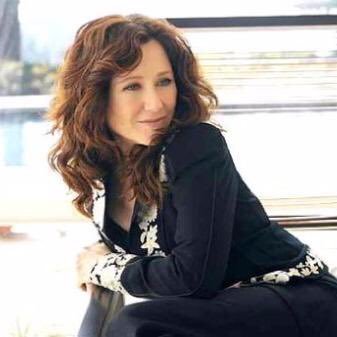
From Fans Point of View: Across the stars
Maria Traver Andujar
March 19, 2017
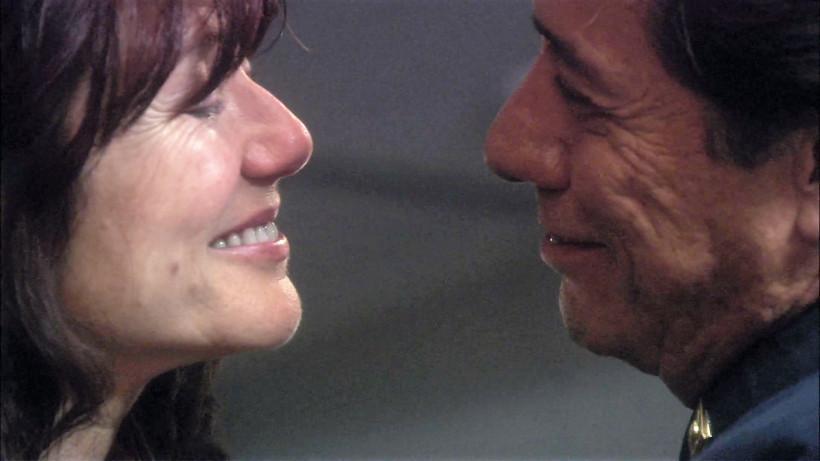
Laura Roslin and Bill Adama are the leading characters of Battlestar Galactica, a SyFy (former SciFi) series which aired in the US between 2004 and 2009. BSG (as it is referred to by its fans) is undeniably an ensemble cast show, where secondary characters get their own fine arcs while main ones blend naturally with the action and the storylines, and share a fair amount of screen time with the rest. However, Adama and Roslin still outstand for a number of reasons that go far beyond the series creator’s intention (we have Ron D. Moore to thank for this) to write them leading scripts.
First and foremost, they are leaders. Leaders by accident, not by choice, in the worst of all the circumstances imaginable. Their leadership is based on values, not political or personal interests; on struggling to tell right from wrong, not on pre-chosen left or right wings or on maneuvers destined to keep the power; on the greater good, not on the selfish needs of a selected few; or on setting an example and the highest standards for their own actions. They are ready to sacrifice themselves (and do we miss this kind of leaders in our world today!).
Bill Adama is the stern military man, used to ordering his crew around, caring for each and every one of them more than he is ready to admit to himself. He is looked up to as a father figure by everyone except for his own son, who cannot bring himself to forgive him for being an absent father and leave him and his younger brother Zak at the mercy of a mentally sick and booze-addicted mother. Lee cannot forgive him either for drawing both of his sons into the military by the sheer force of the inspiration he casts over them like a spell despite themselves (just as he does over all of his subordinates, too) and thus indirectly causing the death of his brother in a flight accident. Lee blames his father, especially, for making him want to be like him as a way to earn his father’s love, which Bill is certainly not gifted at expressing. A lot to overcome.
We are introduced to Laura Roslin as a former school teacher turned into Secretary of Education: a discreet, slightly shy second-line politician, close enough to the president (and attractive enough too) to cast some influence over him, but also sort of trapped in his net (both emotionally and politically involved in it) and quietly struggling to break through, to reveal her inner strength and to let her true self shine. The fact that she has just been diagnosed with terminal breast cancer really does not seem to help her case and her fight.
When the colonies are nuked by the cylons (robots created by men in the past, that come back to destroy their ‘parents’) and the scarce remains of humanity are forced to fly away across the universe, Roslin becomes the president by means of the line of succession: she gets propelled into the office and into an overwhelming responsibility, which you feel inclined to swear is the last thing she needs at this point of her life. Her trembling hands and quivering voice as she swears in confirm our impression.
Adama and Roslin butt heads from the very beginning: even before the attacks actually happen, she visits Adama’s ship, Galactica, with the purpose of decommissioning it. Saying their first exchange is tense would be an understatement. When she becomes the president, they get forced to work together. They set limits, boundaries, and rules to the game they are going to have to play. They compromise. And they have a hard time keeping all of this together: every time they meet to discuss an issue you can quite literally see his frustration at the naïve school teacher in front of him, who unfortunately appears to be also quite determined and stubborn, and maybe even very smart. You can read in her face she is holding back her anger at the harsh remarks and short-sighted strategies of the obnoxious Commander.
The fact that the writers and creators choose (and dare) to place Roslin, a woman, in the highest power position available adds complexity and richness to her arc and to the entire show, by presenting us with a situation we are far from being used to.
As she starts to get her bearings in the turbulent waters of the President’s office and he starts to figure out she might deserve more credit that he had initially granted her, they begin to thread a fascinating relationship: sometimes in agreement, sometimes at odds, sometimes mistrusting each other and, eventually, finding common ground more naturally than you would expect; their exchanges speak volumes about their commitment to their mission. They might not agree about the means most of the time, but they feel equally responsible, and they are equally determined to lead what is left of the human species to safety and salvation, to a new home.
The fact that their ultimate goal is genuinely the same and a deeply ethical one is, to me, one of the keys to the development of their relationship. It is true that there are still a few ups and quite a lot of downs before we see them forgive each other and themselves, coming to terms with the situation and agreeing to start from scratch: now, yes, as a truly united front. Among the aforementioned downs we have Roslin’s drug-induced visions, Adama putting her in the brig just to get shot in the chest mere moments later, the martial law declaration, and Roslin pursuing her religion-rooted mission and thus splitting the fleet.
Exploring the process and the motives that lead them to this turning point would take quite a lot of analysis; let’s just sum it up in a few facts: Adama’s realization that keeping the fleet (the family) together is more important than being right and offering Roslin his forgiveness, gratitude, respect and unconditional support represent the turning point. You can also tell his admiration for her grows to the point of perplexity the moment he learns she has terminal cancer (although he never voices such thoughts). Finally, after days trekking across the rainy forests of Kobol, they open the Tomb of Athena and, for a few miraculous seconds, they stand on the surface of their promised land, Earth. Laura’s mission has given her purpose and drive, as her life slowly fades, and now the facts prove her right on her pursuit.
Adama and Roslin’s relationship gradually shifts and deepens and it is now that its development truly becomes fascinating to watch. Their trust in each other grows and their team work proves effective and fruitful on more and more occasions. As they become partners and then allies and then friends without them even noticing it (as organically as it would happen in real life), their well-defined previous roles get mixed up and the once clear borders between their psychologies and the keys to their actions become blurred. If the start of the series got us used to seeing Roslin as a vulnerable-looking, warm, caring, even motherly figure to the fleet in a very ‘school teacher way’, leaving the harshness, the rudeness, the anger and the tied frown almost entirely to Adama, their roles get reversed more and more often. While she gets rid of undesired political adversaries, with maneuvers worthy of the most refined political strategy manuals, and comes as far as to advise assassination, he is eager to show his crew’s frailest, most humane side for a journalist’s report and slowly finds ways to get closer to his son. Far from feeling out of character to any of them, this evolution provides them with the kind of layers of depth, unexpectedness, richness and contradiction you find in real, living human beings as you are allowed to scratch their surface and progressively get to know them better.
Their friendship is forged, their alliance solid… Once their trust and the support they have in each other can finally be taken for granted under no risk of making a mistake, the way Adama and Roslin balance, reinforce, and counteract each other’s flaws, emotions, decisions and actions becomes a delight for the eyes, the mind, and the heart. She is the greater picture, he is the detail. She is the fleet, he is the individual. She is the one ready to sacrifice anything for the survival of humanity; he is the one making sure humanity stays worthy of survival. She is the one willing to sell as much as her own soul if that buys the fleet a future, if that is what she thinks her mission asks from her; he is the one who will not let that happen. She keeps him sharp; he keeps her grounded. She makes sure he remains capable of paying a high personal price when it is required; he is the one watching the emotional cost closely so that they don’t harden their hearts too much and lose themselves in the process. Both of them carry heavy burdens in their hearts. And slowly, naturally, as it is bound to happen between good- hearted, strong-willed people thrust into positions of power, which leave them lonely, with only the other to share those concerns with, with just the other to listen to their worries and to understand their regrets, they start caring for one another and start looking after each other as they lead and protect the fleet.
As Roslin’s health quickly deteriorates and her death morphs from a distant threat into something imminent, we are given the first unmistakable hints that their feelings for each other run much deeper than any of them is ready to acknowledge. Adama’s tender kiss to Roslin as she promotes him to Admiral represents one of those moments of lucid acting instinct. Brilliantly improvised by Edward James Olmos in the middle of the emotional intensity that the script asks from this scene, it comes out as unexpected to the writers and directors as to Mary McDonnell herself, who plays along beautifully nevertheless, thus completing her part of this poignant scene (none of the subsequent takes resulted as good as the original improvised one which, in the end, made it to the final cut). For the viewers, it is a heartbreaking joy to see this solitary, brave, fragile, ailing woman happy for a second, receiving a proof of love when she has literally nothing left to give or to expect from life, and this military man, all hard shell and soft core, carried away by his own feelings despite being painfully aware (or maybe because of it) that he is going to lose her very soon.
When Roslin’s cancer is sent in remission by a last-minute unexpected cure (to those who have not watched BSG I promise this plays out far better than it sounds) and she remains in the office, she and Adama resume their previous professional relationship. The personal one is carefully navigated, yet it impregnates all of their exchanges: those unspoken things, those unanswered questions, those possibilities they never counted on having given the prospect of her impending death, can now be found in the glint in their eyes, their renewed partnership, their unconditional support for one another, the sidelong glances, the easy, companionable smiles. That is about as far as they can go given their positions, their responsibilities, and their emotionally cautious, reserved natures. Their feelings for each other are far riskier now that she is no longer dying; their personal relationship is thus left pending of a renewed meaning.
Up to this point we have seen them cope with devastation, the decision to blow off a ship potentially full of fellow humans, enemy armies, lack of basic resources, exhaustion, military authoritarianism, and sickness. Now we see them deal with terrorism, the death of their loved ones, black markets, the banning of abortion, the hijack of a baby girl, all before an election which Roslin loses and tries to rig, not because she is selfishly craving the power, but because this is what she believes she needs to do for the greater good, even if she will have to live with that weight in her conscience. Once again, Adama will not let her get away with it. We do what is right, for the right reasons, using the right means. Even in this situation, we can’t do no matter what. And your soul is too high a price to pay to buy humanity’s survival. This is basically what he says to a defeated, broken Roslin who is trapped between her deeply-rooted belief in democracy ethics and her refusal to give up the fight.
She is convinced that the new president’s decisions will only lead them to disaster. Once again, the facts prove her right. But, in the meantime, we get to see her easily falling back into civilian life and resuming her former school teacher profession, as well as allowing herself to enjoy life a little bit, be more mindful of the present moment. Relegated from the presidential duties, she is just one more woman now, and she is more joyfully eager to pursue her romantic relationship with Adama than she ever was before. Their scenes together are tender and subtle, seductive and funny, revealing rather than showing. They are relaxed, easily enjoying one another’s company, letting their body language do the talking: a talking that speaks volumes. You feel inclined to think they might actually be up to more than you get to see, but the camera respects their privacy.
It is not without great pleasure that we attend to the development of this romance between two middle-aged people, something the current fictional TV worlds are not exactly brimming with, as if the experience of love had to be reserved for the younger ones only. Adama and Roslin’s relationship unfolds in a very organic, realistic way. Mary McDonnell and Edward James Olmos’ performances are rich, nuanced, easy-flowing and magnificent. Not just in terms of the romance but in each and every one of the situations their characters are presented with. There is not one single second throughout the series where their incarnation of Adama and Roslin results in hardly believable, superficial, simple, or not living up to the highest standards. They truly infuse life into the characters; they turn them into flesh and bone. A treat. First-class acting.
After the mess of the previous presidential term (I will not provide details so as not to include any more spoilers than strictly necessary) Roslin swears in as the president again. We could not expect otherwise. She and Adama immediately roll up their sleeves and get down to the hard work of leading the fleet together once again. The upcoming months will entail challenges such as reconciliation throughout the fleet after a war period; epidemic disease, genocide, and torture. Their personal dreams and expectations are thus set aside once more. You can feel them hanging in the air, their glances and gestures thick with meaning, full of affection and a mutual attraction they cannot act upon. In the genuineness so characteristic of their relationship, we don’t see them struggling or frustrated. They don’t seem to have a hard time accepting their fate. We see them embrace it and lean on one another, grateful for each other’s presence and support and for the chance to be themselves around the other. It is with the same sincerity that they gradually acknowledge their own and each other’s feelings, providing care, thoughtfulness and affection without treading upon any inconvenient line.
This far into the series, it has already become obvious to any viewer that Adama and Roslin (pretty much as all the other characters in the show) are far from perfect. They have a past containing not just happiness and success, but also a fair lot of hurtful experiences and reproachable actions, certainly not the type of actions any of us would be proud of. They make hard decisions with dark consequences on a daily basis and struggle to find ways to come to terms with it. They call each other out on their mistakes; and are often called out on them, or get figuratively kicked in the ass by other characters (Dee, Athena, Chief, Lee are the first to pop in my mind). Even in their positions of power, they don’t always manage to achieve their goals. They lose their minds and their lucidity flies out of the airlock in certain situations because, yes, they have their limits, too. They have a temper and are not afraid of using it, even with each other. They can be ruthless, also towards one another; even more so when they feel lost, weak, sad, when reality is too much for them to bear. They get cheated on. They are complex, contradictory. They hold regrets for the consequences of rightly made decisions and try not to navel-gaze much regarding the wrong ones. They think more than twice before opening their hearts and souls and they are reluctant to let others get into their privacy. They protect themselves, build walls and have a hard time letting them crumble. The ability they develop to see right through each other and accept what they see is both a curse and a blessing to both of them. It is scary, because it leaves their souls naked to the other, but it is also what ultimately ends their loneliness. Their humanity is compelling in its frailty, in their determination to live up to whatever life requires from them and to keep trying, to keep caring, to never, ever give up and to stay morally grounded no matter what.
As the series progresses into its fourth and final season we get to see both characters reach the summit of their arcs and, simultaneously, we are rewarded with the very best of McDonnell and Olmos’ performances. Roslin suffers a relapse in her cancer, something that plays a relevant role in the subtle way they let themselves drift towards each other. They might not be crossing any lines yet, but they are certainly turning them into blurry, barely-there threads. Bill gets involved at a very personal level: no longer caring to hide his feelings, he reads to Laura during her treatments, helps her endure them, and welcomes her in his quarters as she moves in with him under the plausible excuse of having easier access to the medical attention she requires. They observe propriety but they seem clearly done pretending with each other. They seldom mention or wonder about the nature of their relationship, they certainly don’t act upon their feelings, yet these feelings are the subtext for most of their interactions, especially when they are alone with each other.
If the cancer, as well as the natural progression of their affection for each other, draws them towards one another, we can also see Laura withdrawing, shutting her feelings down, closing emotionally. The awareness that she might not have much time left operates in opposite directions: on the one side it makes Bill more eager to show his feelings, which he does on several occasions through very well selected words from a book he reads to her, a few lines thick with meaning, which allows him express what –out of either caution or difficulty to find his own words- he could not say aloud otherwise. We certainly see them more willing to share their time, their burdens, their intimate thoughts; to enjoy one another’s company. On the other side, though, Laura seems determined to stay focused on her mission for as long as she can without letting anything (or anyone) else interfere. Her disease and the treatments are giving her hell and the feeling that she is running out of time once again makes her reluctant to open up her heart, to let love in. If she allows herself to get softer, it might be just too much for her to take. Thus, she clenches her jaw and fights on. It is her own death that she is facing and she has a hard time wrapping her mind and heart around her tragic fate, as she copes with the side effects of the treatments and the fleet’s business. She becomes harsh, ruthless. She seems sad and lost. Once a strong, focused and resolute woman and president, now there are moments when she can barely tell right from wrong anymore. She loses her wit, her smile along with her hair. Mary McDonnell’s stunning performance accentuates her distress, her fear and her sorrow to a point where we can feel it in our bones.
All this comes to a turning point when she ends up being an accidental cylon hostage in the middle of a mission. The basestar she is visiting in a desperate search for answers to the nightmares that populate her dreams suddenly jumps and disappears with her in its belly. Bill agonizes over her disappearance and, when the decision is made that they cannot wait any longer for the basestar to jump back to their coordinates and that they need to keep searching for Earth, he cannot bring himself to do it. He resigns from his post, stays back and waits for her. The anguish is palpable in the Admiral’s contained expression but it is not until his own son confronts him that we hear him say the words: he cannot live without her. She is his sine qua non.
Simultaneously, Laura’s mercilessness reaches a peak aboard the basestar: we see her resolved on letting her biggest enemy, Gaius Baltar, bleed to death when she learns he was involved in the cylon attacks, which destroyed the colonies at the beginning of the series, and when he even has the nerve to suggest God loves him and has forgiven him nevertheless. Through a series of visions where she is confronted with her own death and its impact on the people that love her most, she finally comes to remember something she was in the brink of forgetting: that life and survival mean nothing without love and that this truth applies to herself in the first place. She needs to let love in. We gradually see her finding the light within her heart, allowing herself to get softer, to feel true, tangible emotions for the people who have come to mean so much to her. Among those people, she surrenders to the realization that there is one outstanding presence, one pillar, one love she cannot and does not want to walk away from anymore: Bill Adama. She stops Baltar’s bleeding, saves his life, and earns the ownership of her heart and emotions (her full compassionate humanity) back in the process.
Roslin and Adama have a poignant reunion aboard the basestar. Once more, it is the amazing performances that express everything the few scripted words are meant for. Choked whispers, shy smiles; emotions barely held back in the way we have already grown accustomed to; watery eyes giving everything away. Their whole interaction melts our hearts. Tenderness exudes every take without resulting too affected or overacted. This is a mature love performed by mature actors. And it shows. Her ‘I love you’ (at last) whispered into his ear like a secret only for him to hear is met with him shutting his eyes with force against the flood of emotion that washes over him. His ‘About time’ is the perfect reply which conveys everything that needs to be said in just two words: I know, I have known all along, I love you too, I was waiting for you, thank you. To Bill and Laura, speaking in half-words, trying to keep everyone else oblivious to their feelings for each other, comes out naturally from habit given their positions and the inconvenience to get romantically involved, as much as from their reserved, private personalities. If anything, the economy of words makes the whole thing all the more intense, poignant, and believable. It feels just right. At last, emotion takes over: Bill and Laura wrap their arms around each other in a powerful, tear-jerking embrace. We see her cling to him and cry, letting everything out at last, literally melting into him, trusting him to hold her up. The last take does not let us see his face but I personally believe he sheds a few tears, too. Not even the Admiral of the fleet can hold back when he no longer needs to do so, when he has just heard the woman he loves say she loves him back (after getting so close to losing her) and there is absolutely no one around to object to their display. During the series we have heard him say ‘I love you’ in many different ways: ‘it is good to see you’, ‘that’s a nice color on you’, ‘you made me believe’, ‘missed you’. He is the master of saying it all without saying the actual words and we forgive him: it is part of his charm, and emotion spills out of his eyes, his expressions and his actions all the time anyway. As a matter of fact, at this point in the story he is the gentlest, most emotional member of the couple without a doubt.
In the second half of the fourth and final season we see Bill and Laura fall from the ecstatic heights of having confessed their love to each other and found Earth to the most terrible grief, disappointment and loss of hope when the planet turns out to be an uninhabitable nuclear wasteland. Laura lets herself fall to the floor (literally), burning down to ashes what is left of her faith (also literally), drowning in regrets and guilt for having pursued the wrong path, losing thousands of lives along the way. The mission that gave her purpose, that infused meaning to her pain and her sickness, is a blatant lie. It is dust. Bill, on his part, clings to the bottle and tries to provoke his best friend and cylon Saul into putting a bullet in his head to end his suffering.
Defeat, desperation, suicide, exhaustion, lack of purpose, of meaning, of direction. All these painful emotions mark a new turning point in at least two different ways.
On the one side, Laura’s priorities shift abruptly. If she needs to keep living, if there is something left in her life worth fighting for, it certainly has nothing to do anymore with any noble mission or the search for an inhabitable planet with a more than unlikely outcome. She is done with the presidency; she is done with her role as dying leader (that she had embraced as early as season 1 in accordance to the Book of Pythia, their sacred scriptures); she is done with the endless demands of the Quorum and the fleet; she is done with her treatments that buy her time at the expense of draining her energy and numbing her soul. If Bill manages to recover and gets ready to resume the search from the same point where they had left it (after allowing himself to drown in both sorrow and booze for a while), for Laura there is no turning back. From now on and for whatever time she has left she is going to live on her own terms. She needs to push Bill a little bit, to shake him to make him realize it, but eventually he surrenders: it is time for them to live, here and now. They deserve it; they need it. As delightful as it is for the viewers to see that (now, yes, without a doubt) they have consummated their love at the physical level, at this point it almost seems a sweet add-on which might not be essential. The point of the whole Adama/ Roslin story is not that they end up in bed (or that we get to actually see it): they have already spent years making love (of the truest, deepest, most mature kind) with their glances, their hands, their ever-present affection for each other, their acceptance and forgiveness of each other’s weaknesses and flaws. The physical relationship might be the next natural step in a slow-burn love story such as this one and it is certainly refreshing to get to witness it in that, once again, there is no taboo in showing how mature people are still sexually active (and judging by their expressions, in a very satisfying way). All of it is organic, raw, naked and so very tender. However, there is so much more to Adama and Roslin than just that.
On the other side, the situation marks a point of no return with regard to the fleet. Morale has gone out of the airlock and, pretty much as it often happens in real life, frustration and disappointment quickly become rebellion. Laura and Bill’s well-deserved downtime is sharply interrupted when a mutiny outbursts in Galactica. Forced back into their power positions in the middle of a life-or-death situation, we see them rise with resolution and take charge once again. Their lives (and those of many others) are at stake in a nightmarish scenario where you can no longer tell who your enemy is. Humans pick sides (either with the rebels or with the defenders); cylons mostly align with the defenders (interestingly enough; but exploring the depth and the humanism in BSG, fascinating and mind-blowing as it is, is not the point of this article).
Once more, Roslin and Adama, McDonnell and Olmos, leave us jaw-dropped. In the relatively short screen time they get during this arc (the fast-paced action is supported by almost all the characters still available) we see them experience domesticity, realization, determination, anger, passion, worry, wrath, despair, defeat, relief. From the greatest display of strength to the most heartbreaking vulnerability, they cover the entire ample range of emotions in-between leaving us stunned, exhausted, and moved to our very core.
At this point in the series, there is not much left when it comes to Roslin and Adama. In the remaining episodes we get to see Laura’s health quickly declining and Bill refusing to believe it, seeking refuge in the bottle whenever the prospect of both Laura’s and Galactica’s demises becomes unbearable. If the scenes where Bill is broken do not feel gut-wrenching to you, you probably need to have your heart checked, because Edward James Olmos’ incarnation of Bill’s hopelessness is agonizing to say the least. Laura’s arc reaches its summit (as, simultaneously, Mary McDonnell breaks all the acting ceilings yet one more time) in the poignant, heart-wrenching scene where she explains to Bill she has found home with him after searching for it her whole life. Home is not a physical space, a house, or a planet: home is where your heart belongs. So close to crossing the threshold to the afterlife, she loves and is loved. She is at peace at last.
Laura dies. Laura dies soon after they arrive at Earth (our Earth, the true Earth finally) and it is okay, and it has to be this way, because saving her again would be cheating on the viewers, betraying the realistic tone of the entire series, failing to comply with the prophecy, denying Laura’s arc a meaningful, satisfying completion, and maybe even indirectly insulting all the cancer patients around the world (all of us are painfully aware of the many lives this disease takes still today).
It does not make it less painful to watch.
Bill is with her and, as soon as the scene starts, it is clear you will not be allowed to get away with a happy ending for your beloved couple, no matter how badly they deserve it and have earned it. Furthermore, you are expected to watch it. You owe it to them, to Laura and Bill, whatever the cost in tears is (and believe me, in my case it took me to the verge of dehydration). Everything get us headed to (if not ready for) the end: the way she is determined to keep admiring the beautiful world around them (despite the fact she can barely make out forms, colors, or breathe now); the knowing looks and smiles she and Bill exchange, both of them aware that this is the end, both of them serene in their pain; Bill carrying Laura’s limp body to the raptor to offer her one last gift- a flight to catch a closer glimpse at the scenery and the wildlife from the air-; the goodbyes between them, Lee and Kara (at this point I am already sobbing uncontrollably).
The moment of Laura’s death is highlighted and put in context by a few previous flashback scenes where we get to see her in her former life in Caprica, in her condo, stuck with people, emotions and situations that feel superficial and dissatisfying to her; struggling to find a purpose to which she can commit “all the way to the end”. As Bill flies her over the green hills and flocks of pink flamingoes, gently talking soothing nonsense to her, we realize she has found it. She has both carried out her mission and stayed by Bill’s side all the way to the end. Until her very last breath.
When she lets out this last breath, we stop breathing along with her. The few seconds Bill keeps talking to her, until he notices she has already left, are pure anguish. Time and space get suspended until he casts a glance at her, realization dawns on him and he takes her wrist to check a pulse that is no longer there. He kisses her hand as his features contract in agony. It is no longer Edward James Olmos inside that raptor: it is Bill, alive and grieving, his guts slit open and, just like him, we forget everything else and dissolve into a puddle of tears we could not choke back even if we tried. Not that any of it matters anymore: Laura is dead.
The moment Bill places his wedding ring on Laura’s lifeless finger, we fear we will not be able to take it any longer. It is his last vow to her, his way of giving himself to her completely, no matter that she is gone; his warning to the universe that tears them apart that they will always belong to each other. The last we see of him takes place beside her grave: he is talking to her, describing to her the beauty of the world she led them to, telling her he is building the cabin she dreamed of sharing with him. Remembering her, living for and with her, forever.
Not only because of Laura’s death (all characters get poignant, compelling arc closures) but mostly because of it, I stayed crying on the couch, curled up in fetal position, for more than half an hour after the end credits of the episode were over, in a silent, empty room in the middle of the night. I could not bring myself to rewatch any scenes or read anything remotely BSG-related for weeks after. I was mourning Laura.
I still do.
I still do, and this article might be, among other things, one of my many attempts to keep her alive. She literally brought me to life, dragged me from illness, raised my awareness of myself, untapped my potential, and healed my soul. As politically incorrect as this may sound, I care more about her than I do about certain living creatures. She has done me good only; I cannot say that of every person I have crossed in my four decades of life.
Bill Adama and Laura Roslin. They were the leaders of the fleet; they became the parents of the battlestar Galactica family. Bill Adama and Laura Roslin were meant for Edward James Olmos and Mary McDonnell as much as Mary McDonnell and Edward James Olmos were meant for Laura Roslin and Bill Adama.
I honor these characters. I love them in their vulnerability, their struggle, their weaknesses. They are broken, they are flawed, they are brave, they rise. They love.
And they have taught me a whole frakking lot about all this.
